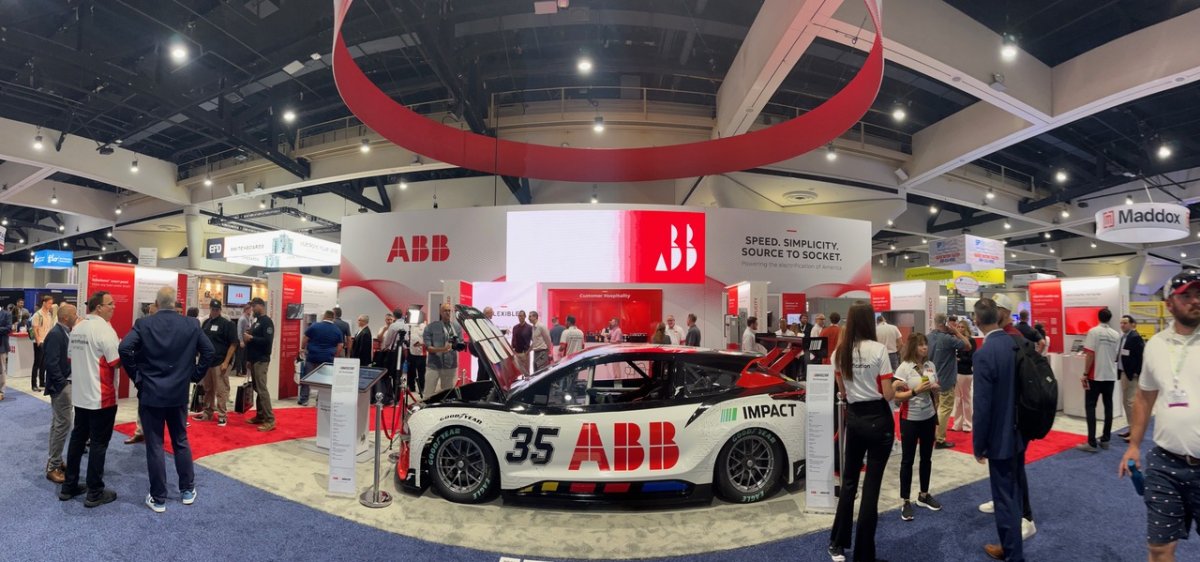For over 75 years, NASCAR has delivered high-octane-fueled thrills to millions of fans who flock to race ovals, where the air is filled with the smell of smoked tires and the roaring sound of combustion engines. But now—as even diehard stock-car buffs turn to electric and hybrid vehicles in their daily lives—the motorsports company has rolled out an experimental EV racing prototype.
NASCAR announced a commitment to achieve carbon neutrality by 2035 and introduced its experimental EV this past summer. Designed by electrification tech company ABB, in partnership with Chevy, Toyota and Goodyear, NASCAR describes the vehicle as "a generic Crossover Utility Vehicle (CUV) body made of sustainable flax-based composite." It has a 78 kilowatt-hour battery that feeds three motors producing 1,300 horsepower and can accelerate faster than a traditional combustion engine race car.
But for all its impressive stats, ABB spokesperson Chris Shigas says the EV is most important for its enormous educational value and opportunity.
"We're not just exploring the future of electric racing. We're also increasing energy education," Shigas says. "With the NASCAR prototype, we're able to reach so many people, which is crucial. Energy transition is for everyone. As we strive to lower emissions and electrification becomes the norm, there will be huge demand for workers. We'll need electrical engineers, mechanical engineers, master electricians. The prototype encourages education about that energy transition for masses of people and a whole new generation."

NASCAR isn't the first motorsport brand to explore electric vehicles. In 2014, Formula One launched an EV offshoot brand, Formula E, which has proven popular with fans as well as EV industry experts. Formula E vehicles are equipped with batteries that make up to 350 kilowatts of power and can reach speeds of 199 mph, rivaling the speed of F1 cars.
Formula One, however, is known for its single seater futuristic-looking vehicles. By contrast, standard NASCAR vehicles look more like typical sedans, which could help win over skeptical Americans who have been slow to fully embrace the EV market. The aesthetics of NASCAR's prototype vehicle are key to preserving the brand's tradition while also embracing sustainability.
And while ABB is a sponsor of Formula E, Shigas is quick to note that "NASCAR remains committed to the roar of the combustion engine." Still, the prototype attracts a lot of attention from traditional car enthusiasts at trade shows. "They've got a lot of questions," says Shigas, "They want to know about performance, how heavy it is, how well it performs on certain tracks."
So how does it perform? The answer isn't cut and dry.
The prototype made its debut at the Chicago Street Race, a new initiative for NASCAR races that take place on city streets. Launched in 2023, the street races have been credited with attracting a new and younger audience. F1 has seen similar success with street circuit races.
Beyond introducing the prototype vehicle to a demographic that might be more willing to accept electric cars, the decision also catered to the experimental EV's sustainability strengths, which include drawing regenerative power from braking. Racers driving on superspeedways in combustion engine-powered cars generally keep their feet on the accelerator, even when making extremely tight turns. This gives them a speed advantage on super tracks where heavier EVs must brake to navigate tight turns.

All of these factors are part of a necessary learning curve that has implications for cars on and off the track. For the most part, NASCAR has limited its EV prototype to demonstrations on more compatible tracks and at trade shows.
But Shigas says that most racing enthusiasts he encounters are invested in learning more about how the EV is manufactured and how it will evolve over time. And it makes sense that the public would appreciate the opportunity to get up close and personal with an innovative version of the EVs many drivers use daily.
The prototype EV is a real-time experiment not only in technology but also in measuring what will be a more significant cultural shift across industries. If NASCAR, a brand steeped in the glorification of gas-guzzling power cars, is willing to explore sustainable alternatives—which could potentially extend to using microgrids and solar panels to power race cars—it might be more likely that other emission-heavy fields like aviation, semiconductors, data centers and even construction will follow suit.
To read how Newsweek uses AI as a newsroom tool, Click here.



